Humans have, starting in prehistoric times (with obsidian, red ochre, etc.), established vast trade networks that cross mountains, deserts, and oceans. Presumably, this will be true in the future as well, even as humanity expands out into SPAAACE. While there are reasons why larger concerns will tend to dominate, the little guys will often provide more engaging narratives. Thus, these five heartwarming tales of working traders enthusiastically engaging in commerce among the stars…
The Trouble Twisters by Poul Anderson (1966)
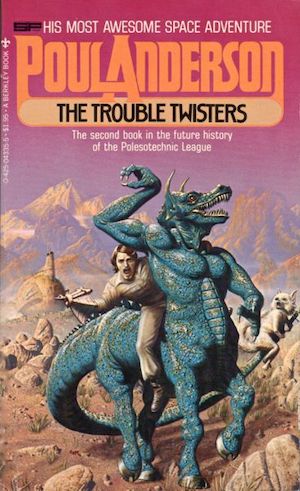
Hyperdrive gave humans the stars…also vast fortunes to Polesotechnic League merchant princes like Nicolas van Rijn. Great men cannot be everywhere, however, which is why this collection of short pieces focuses not on van Rijn but his employee, David Falkayn (don’t worry! David eventually gets into management by marrying the boss’s beautiful daughter). Whether upending religious prohibitions, obtaining state secrets, or intervening in bitter ethnic strife, Falkayn and his co-workers always find the solution that delivers profit.
Long after the events in this book, Falkayn would become disenchanted with the League’s conscience-blind focus on immediate profits. This would have regrettable implications for Falkayn’s relationship with van Rijn, but without actually saving the League or humanity from the consequences of the League’s short-sighted policies. But at least they generated lots of profit for the shareholders1 before the League-armed space barbarians descended from the skies.
***
Merchanter’s Luck by C. J. Cherryh (1982)
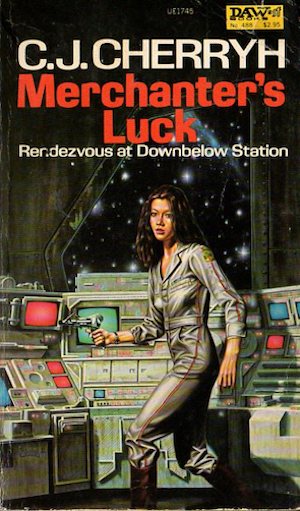
The Company War is over but its consequences remain daily reality for Sandor Kreja of Le Cygne. Mazianni pirates slaughtered most of Le Cygne’s trading family. The trio of survivors turned to bold trading gambits. The end result is a criminal record that forces a now solitary Sandor to use an assumed name lest outstanding charges catch up with him. Sandor is therefore a very cautious man.
Love defeats all, including (in Sandor’s case) sensible prudence. Smitten with the Dublin Again’s Allison Reilly, Sandor’s flamboyant romantic gestures make the news, never a good move for a wanted man. Much worse from Sandor’s perspective, his new fame and promising alliance with Dublin Again make him potentially useful to the war ship Norway’s Signy Mallory in her struggle against Mazianni remnants…useful as bait.
***
Stopping at Slowyear by Fredrik Pohl (1992)
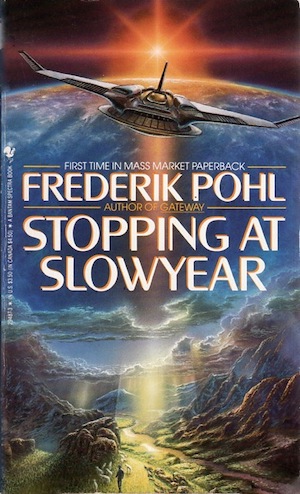
The Nordvik has visited eight star systems in the twenty-seven years Mercy MacDonald has helped crew the interstellar trader. Her career has stretched even longer by planetary calendars, but since the Bussard ramjet-propelled craft never returns to any system it visits, the consequences of relativistic time dilation can be ignored. What she cannot ignore is her reluctance to spend the rest of her life on Nordvik.
The Earth-like planet Slowyear orbits an F8 star; one Slowyear year is as long as five Earth years. Despite the challenges presented by extended seasons, Slowyear’s settlers have created a tidy little pocket civilization that at first glance certainly seems a better deal than spending decades on a cramped, ancient starship. Some might find Slowyear quaint and rustic. For Mercy, Slowyear is the world where she will spend the rest of her life.
***
Trading in Danger by Elizabeth Moon (2003)
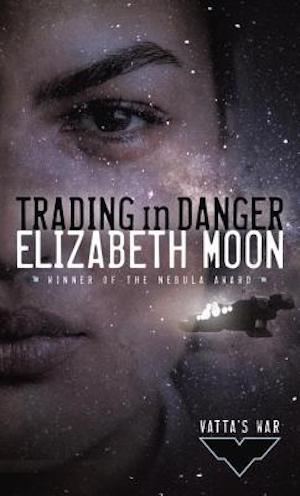
Ky Vatta means well, which turns out not to be a sufficient defense for a PR-unfriendly attempt to assist a friend as far as Slotter Key’s naval academy. Summarily expelled from the service, Ky is forced to turn to her family for employment. Happily, the Vattas own a merchant fleet. Less happily, the ship they entrust to disgraced Ky is the Glennys Jones, a run down, obsolete trader whose main value is as scrap.
Previous deferment of necessary ship maintenance forces Ky to seek money for repairs. Ideally, she could draw on the Vatta line of credit to pay for this. Inconveniently, not only is it unclear whether she has the legal ability to do so, an unprecedented attack on the ansible network makes it impossible to contact the Vatta head office. The subsequent appearance of heavily armed, fast warships with an interest in the Jones is nowhere in Ky’s business plan, but it is a development with which she will have to deal.
***
Chilling Effect by Valerie Valdes (2019)
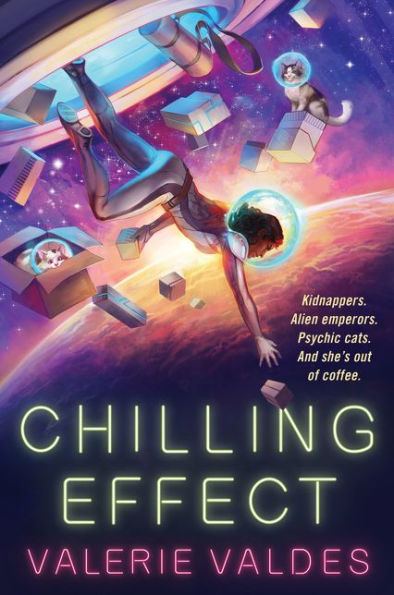
Eva Innocente comes from a family of bold entrepreneurs. Other people uncharitably call them career criminals. Unenthusiastic about her clan’s chosen occupation, Eva has managed through great effort to put the criminal life behind her. Now she’s the captain of the starship La Sirena Negra, on which she and her crew eke out a meagre living delivering legitimate cargoes.
Just because Eva is done with criminal life does not mean the criminal life is done with her. The interstellar criminal concern known as the Fridge reaches out to Eva. The Fridge has taken Eva’s sister Mari hostage. If Eva would like Mari not to spend an extended period on ice, Eva will have to keep the Fridge happy by running a few highly illegal errands. Faced with the need to convince her crew to play along with a plan with no possible benefit to them, Eva does the only sensible thing and resorts to blatant lies. It’s a short-term solution, but Eva only has to worry about the long term if she and her friends somehow manage to live that long.
***
Star traders are a popular trope—I could have populated this list solely with books by Andre Norton and written a sequel featuring books by Poul Anderson—so no doubt you have your favourites which are reprehensibly not mentioned in this article. Feel free to mention them in the comments below.
In the words of Wikipedia editor TexasAndroid, prolific book reviewer and perennial Darwin Award nominee James Davis Nicoll is of “questionable notability.” His work has appeared in Publishers Weekly and Romantic Times as well as on his own websites, James Nicoll Reviews and the Aurora finalist Young People Read Old SFF (where he is assisted by editor Karen Lofstrom and web person Adrienne L. Travis). He is a four-time finalist for the Best Fan Writer Hugo Award and is surprisingly flammable.
[1]Even better, Falkayn and company’s zany schemes in 1967’s “Day of Burning” helped turn the Mersians into humanity’s bitter enemies, one consequence of which was the millennia-long dark age, the Long Night. Not many people can truthfully say they set in motion events that doomed civilization; Falkayn is one of the lucky few.










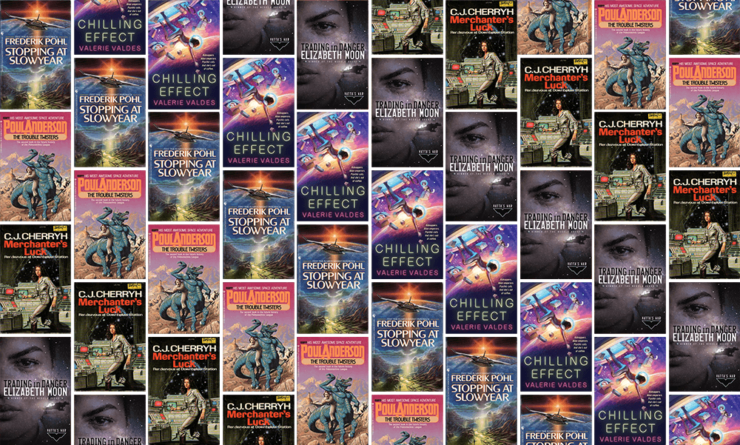
A number of Sharon Lee & Steven Miller’s Liaden books use trade to drive the plot, perhaps no e more than Balance of Trade.
Harry Turtledove had a handful of trader stories that were turned into the fix-up novel Earthgrip. He was pretty clearly using Anderson as something of a model.
It also occurs to me that David Falkayn could easily have been on the list of do-not-date characters, especially in his younger years when he shares van Rijn’s attitudes towards women.
“Tuf Voyaging” is sort of about interstellar trade.
And interstellar traders are an important part early on in Asimov’s “Foundation”
Boy, I bet Nick was overjoyed when the young man for whom Nick was a role model in romantic shenanigans started dating Nick’s daughter.
Signy Mallory, not Signe. A few Worldcons back I heard a song written from the point of view of Sandor’s dead brother’s tape recordings; I must track it down someday. On the other side of Sol from the Alliance and the Union, the Compact is big on space trucking too.
Little Black Rule: Unsurprisingly given Anderson’s influence on the game, space trucking is one of the archetypal occupations for players in Traveller. It is strongly suspected this in turn influenced a much-mourned TV show that had a fair amount of questionable subtext, and as it turns out a questionable creator.
@@.-@: Well, you know what they say about Karma. To be fair to Falkayn, he wasn’t as slimy about it as his boss. Of course, he had the advantage of being young, fit and good-looking…
An interesting pair of books: The Skinner and The Shattered Stars by Richard S. McEnroe, which feature the same character, once as a young hopeful trader and once as an old guy who has been ground down by the realities of the economic system in which he works.
You already know about Grand Master Norton’s wares. A more recent, and deeply, deeply satisfyingly textured, novel about STL interstellar traders is THE LIGHT YEARS by RWW Greene.
I approve on many levels, of course. But the male lead is casually bisexual and that earns my deepest respect. I did indeed review it, should anyone wish to look.
Re Stopping at Slowyear (which is a very good book) you said “For Mary, Slowyear is the world where she will spend the rest of her life.” I think you might mean Mercy, not Mary.
A couple of Heinlein’s novels revolve around interstellar trade, in particular Starman Jones (though the story is set on a passenger ship, not cargo) and Citizen of the Galaxy. A large chunk of the latter has its focus on the the culture of nomadic space crews and would look quite at home in e.g. Cherryh’s universe.
There’s always the Qeng Ho of A Deepness In The Sky, whose culture is designed to occupy the interstellar trader niche as a way of building a lasting society in a universe where FTL doesn’t seem to be possible.
@5, 9–thanks! The names have been updated. (Edit: Also @12!)
@11: Now that I think about it, Sandor’s last name is Kreja, not Kreje. Apparently es are an intrusive species.
Augh. If my brain does not get on ball, I am going to poke it with a sharp stick.
@13 Didn’t you just do that to your arm?
Another person who can’t hear the words “in space” without some extra “a’s.” Those dang Muppets!
I did some searching through my reading/review list for the topic as I usually do for these articles, and I could only find Andre Norton’s novels. And she wrote a lot space traders beyond the Solar Queen stories.
I did! I am fully vaccinated! Even better, I got fully vaccinated in a pharmacy right next to an ice cream store!
Less good: I got my jab early because people have been no-shows for their vaccinations.
It’s not interplanetary trade (takes place in a post-nuclear Earth), but I remember really enjoying Trader’s World by Charles Sheffield.
I thoroughly enjoyed the first few Solar Clipper books by Nathan Lowell, beginning with Quarter Share, though I dropped off reading the series later.
One of my favorites is MCA Hogarth’s series beginning with Earthrise (the first is free in ebook, I think) has a trade ship – constantly broke, enjoyable multispecies crew – whose captain was saved from debt years ago by a mysterious person she knows only via secure communications. Now the debt is being called in.
@1 and @10 The Liaden and Qeng Ho were my first thoughts also. And don’t forget Star Wars, which according to The Phantom Menace, was all about blockades and taxation of trade routes.
Bit surprised that the example of a Cherryh work wasn’t the Chanur books, as they are all about trading among the half dozen plus sentient species.
You can also do Weber’s entire Honorverse, because Manticore is as much about trade as it is having a vibrant Fleet to protect it.
Cherryh’s older, less Epic! books don’t get nearly the attention they deserve.
James Blish’s Okie stories ought qualify. There about interstellar trade and adventure.
Alastair Reynolds Revenger and its sequels feature interplanetary trade, and pirates.
First Contract by Greg Costikyan. Advanced extraterrestrials contact Earth, which is a) immediately flooded by cheap goods far better than anything Earth can produce and b) Earth’s businesses find that they have nothing of interest to the ETs. It gets better, but the Earth is very much at the bottom of the economic hierarchy.
As soon as I saw the title of this essay, I knew you’d go to Nicholas van Rijn, and probably Andre Norton; sure enough, explicitly the first, with a mention of the latter near the end. I then decided to bring up Heinlein’s Citizen of the Galaxy, but was beaten to it. It appears I need to see your posts within an hour or two of going up!
Anyway, I was thinking of major SF authors; Asimov, as already noted, mentioned traders but only obliquely in the Foundation trilogy. I can’t think of a good example of Clarke or Bradbury doing interstellar trade, offhand. (Cue dozens of people coming to tell me I’m wrong, with examples.)
Doc Smith had a few traders in the Lensman books, but never told the story from their point of view, or made the story mostly about the trade. That’s about all I can think of.
Oh what I would not give to learn more about about the Mazianni and their alleged secret planet with forests. Such a tantalizing suggestion.
That is an impressive collection of cover art. I love each and every one in its own way
That is an impressive collection of cover art. I love each and every one in its own way
Andre Norton was always a writer I wanted to like more than I actually did like, and the books I wanted to like most were the Solar Queen and other space trader books. It wasn’t just the trading, it was the fact that they were stories about people who just had a job to do and did it, and also incidentally there were psionic cats and whatnot. It was blue-collar trading, so to speak. She channeled that feeling very well, in a way that some later stories don’t. Catseye had the same sort of feel.
Cherryh’s Finity’s End (and why, in the name of all that is good and holy, are so many of her 80s/90s books not available in eBook?) really digs into the nuts & bolts of interstellar trade and competing merchanters trying to get the jump on each other.
Because I read fifty Norton right after Heinlein’s juvvies, I noticed that while Heinlein’s kids often ended up with middle class dreams, Norton’s protagonists were sometimes happy to transition from career criminal to the working class. Sometimes all they wanted was a ticket out of the Dipple.
I would absolutely second the above poster’s recommendation of Nathan Lowell’s books, and I’m sorry OtterB dropped off reading them. He has a new book still working through the editing process that will look at trading and economics from a fantasy viewpoint.
@1 and @18: Belatedly, I arrived to be sure the Laidens—and especially Jethri—were mentioned. Happily, there will be a long-desired direct sequel to Balance of Trade and Trade Secret, probably published by the end of December.
@22 mentions the traders in Alastair Reynolds’ Revenger series, but many of his Revelation Space novels and stories involve the often-augmented Ultra traders that carry mysterious items and information between systems at sublight speeds.
In general I’m pretty skeptical of the economics of Star Wars-style interstellar trading, where a captain of a small vessel can make money from lifting goods out of one gravity well and transporting them through hyperspace to another gravity well. It implies that energy — along with antigravity, reactionless drives, and hyperspace travel — is so cheap that it must distort the economy in other ways.
Foundation has the curious detail that vegetable farmers can turn a profit trucking their goods to other worlds, which means travel must be very, very cheap.
I’m surprised that nobody has brought up Charles Stross’s Merchant Princes series.
Ah, Cherryh, with interstellar trade in ore and dried fish… even in the STL days.
“On the other side of Sol from the Alliance and the Union, the Compact is big on space trucking too.”
Compact seems to get by with much smaller trade ships though. At least the Hani standard seems to be stuff like Merchanter’s Luck’s ship, or much smaller, not the huge 100+ person clan ships like Dublin Again.
@0 (footnote): would the Empire really have survived if Merseia weren’t the Big Bad? It was getting pretty rotten by itself, such that parts were trying to walk away on their own.
@19: Merchanter’s Luck is a standalone, rather than part of a larger bloc; that’s part of the reason it’s my standard answer when somebody asks where to start with Cherryh. It’s also more involved with trade — how a small operator survives on scraps — rather than the trade being incidental to the territorial arguments.
@21: a fine distinction: in the Okie books the Cities offer services rather than goods (cf the new motto on “New York” ‘s city hall: “Mow your lawn, lady?”). It’s ironic, because the cities are one of the few instances of transports big enough that trade in goods might be plausible (cf @34), where trade in knowledge is much easier (cf “The Fourth Profession”) because knowledge masses so little.
@35: there is no space travel in the Merchant Princes books; the commerce (unbalanced enough that I wouldn’t call it “trade”) is between parallel Earths. It’s also more about the political games played by people who have gotten rich through trading — but the above discussion has plenty of examples where trading is simply the reason a corner-cutter is on the scene when something blows up.
IIRC the book is on our host’s squick list, but The Witches of Karres begins with someone who is trying to win a woman’s hand by proving himself as an interstellar trader — although in many cases the trade starts with a race in which the forfeit is to buy some of the wide array of goods the lead left home with. It does drift quickly into carrying passengers rather than goods, probably because passengers can have covert motives (driving the story) while goods just lie there.
@@@@@ 37, chip137
@@@@@0 (footnote): would the Empire really have survived if Merseia weren’t the Big Bad? It was getting pretty rotten by itself, such that parts were trying to walk away on their own.
Poul Anderson based that conflict on the Roman-Persian wars. Each battled the other to exhaustion.
But Rome would have fallen anyway. All empires fall. All else aside, they are economically unstable. Sucking wealth from the outlands. Giving little back.
The closest thing to an exception are the hydraulic despotisms. And even they collapse. Though they tend to recreate the same systems. E.G. Egypt’s Old, Middle, and New Kingdoms.
The remarkable thing about the Roman Empire is that it lasted as long as it did. Persians or not.
37) Still, Merchanter’s Luck benefits from knowing the background presented in Downbelow Station
@23 If alien goods are cheap, the aliens must be prepared to give large quantities of them in exchange for small quantities of human goods. In which case it cannot be the case that the aliens do not value human goods.
@38 The fall of the western Roman Empire seems to have been regarded as a disaster by everyone in the oppressed provinces liberated from Roman rule.
More generally, in every polity the governors get something from the governed. Calling some of those polities “Empires” changes nothing in that respect. Not even the method by which the people in power get to become the people in power.
In fact the Roman empire was considerably less oppressive than many of its predecessors and contemporaries. As the Monty Python Troup famously pointed out provinces got roads, water supply, baths and indoor plumbing. There was also a lot of local autonomy. Roman citizenship was widely available and well worth having. The general standard of living in Roman territories was high by ancient standards and while Rome certainly did take resources from the provinces there was a considerable amount of internal trade between provinces. The Roman empire lasted and it’s influence is felt to this day because the ruled did get something out of it.
When very young indeed I read a short story in which the main theme was that what Earth would have to export to an advanced galactic civilisation was art in all its forms I don’t think it was Heinlein but there was a “state versus individual” side theme. Interesting that this has already become true(r) on Earth with the development of a global economy. Also interesting what sticks of books read fifty years ago…….
Clifford Simak had a story in the Galactics turned out to have an enormous appetite for Terrestrial pulp fiction. I think it was So Bright the Vision.
In Heinlein’s Citizen of the Galaxy there’s an alien species which happily trades jewels for girlie magazines.
@41,
Perhaps dumping useless stuff on the benighted natives was part of the business model. I read the book a long time ago, and do not remember any details
48: Like the time Canada donated a stack of Canadian-made fire hydrants to a community without the infrastructure to use them, the point being not to assist with fire protection but to shore up a Canadian company.
@45: There’s what we used to call a round robin circulating on Tumblr in which we discover that we are the LIttle Fuzzies of the galaxy. We don’t have to worry about establishing our economic bona fides because we’re just so darn cute! Aliens are happy to host us! They squee over Space Tiktok clips of humans doing perfectly ordinary things like eating or playing sportsball! They post long lines of emojis beneath photos of the Statue of Liberty or the Jesus of Rio de Janeiro on Space Reddit (r slash cuteness)!
On one hand, we get to travel to anywhere we want to go, and acquire anything we point at, for free, as long as we don’t mind being cooed at wherever we go. Plus, our entire stellar system is a protected zone. On the other hand, it’s almost impossible for a human to be taken seriously.
@@@@@ 50, Jenny Islander:
@@@@@45: There’s what we used to call a round robin circulating on Tumblr in which we discover that we are the LIttle Fuzzies of the galaxy. We don’t have to worry about establishing our economic bona fides because we’re just so darn cute! Aliens are happy to host us! They squee over Space Tiktok clips of humans doing perfectly ordinary things like eating or playing sportsball! They post long lines of emojis beneath photos of the Statue of Liberty or the Jesus of Rio de Janeiro on Space Reddit (r slash cuteness)!
Randal Garrett wrote a short story in which Galactic Civilization thought Earth picturesque. It had nothing else to offer them. The only thing they enjoyed—the only source of galactic currency—was one human’s book describing his galactic travels. They thought it was hilarious.
https://www.gutenberg.org/files/30816/30816-h/30816-h.htm
@1, 18, 32 – I’ve always wanted to visit the Pet Library on the Dutiful Passage and I loved the most recent book “Accepting the Lance” searching out new trade routes. Reminds me of the trade caravans along the Silk Road, away from home for years at a time. Also happy to see the link back to Jethri.
For a less benign view of trade, Scalzi’s trilogy starting with the Collapsing Empire somehow combines a trade system distorted for monopolistic benefit and hopepunk.
@50/51 — Now I’m thinking of Cat Valente’s Space Opera, which isn’t precisely about trade, but it kind of is if you squint?
Dare I mention, galactic economics was the main driver behind everything in Hubbard’s “Battlefield Earth”? Perhaps we’ve all recovered from the movie trauma by now.
@46: “So Bright the Vision” does fit that description. (I bought, new, the Ace Double which that was the title story of one half of, and still have it.) OTOH, pulp fiction is hardly the strangest Earth product to want; see (e.g.) Damon Knight’s “The Big Pat Boom”, in which the object of desire is perfectly-dropped manure.